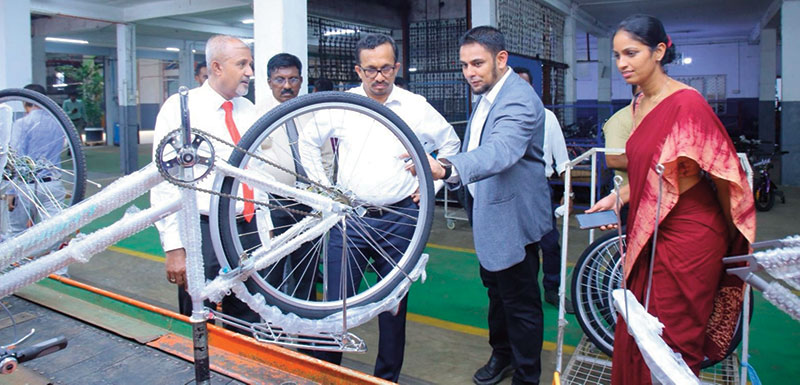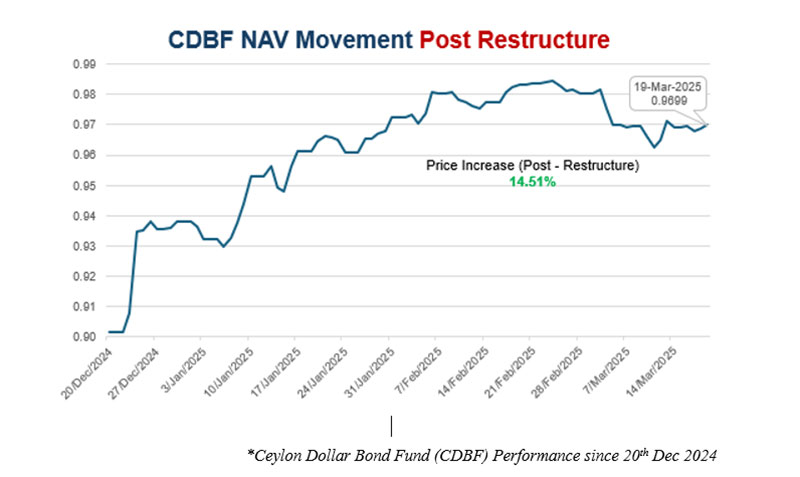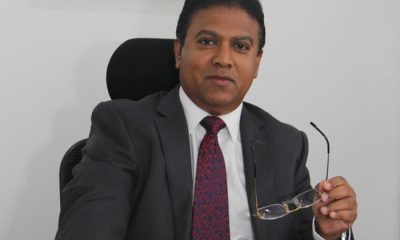Business
Academic says there’s a ‘silver lining’ in brain drain

-
SL diaspora is privy to most updated technologies in advanced economies
-
Govt can take a cue from India and introduce a special visa category for them
-
Diaspora entrepreneurs’ linkage with global networks should be harnessed
by Sanath Nanayakkare
Policymakers can encourage the Sri Lankan talent pool which is spread across the developed countries to shift their base back home if they pull the right policy levers, said the head of department of a leading university in Sri Lanka.
Dr. Janaka Fernando, Head of Department of Business Economics, Faculty of Management Studies and Commerce at the University of Sri Jayewardenepura said so in the backdrop of widely spreading fear that skilled migration will have overwhelmingly negative effects on Sri Lanka.
Exclusively speaking to The Island, he said,” The Sri Lankan talent pool which has found stable doing business and improved living conditions in developed countries can be lured to shift or relocate their operations in Sri Lanka if the policymakers correctly identify their capacities, interests and their patriotism.”
“A fair share of this Sri Lankan talent pool in those countries would come back home to start new businesses in their motherland if the authorities make the domestic environment conducive to professionalism, startups, incubator nest hubs, industrial parks etc.,” he said.
The following are some excerpts from the interview with Dr. Fernando.
“Brain drain isn’t a new phenomenon in Sri Lanka. It has been in existence for more than six decades and it occurred in different ways at different stages of our history. The diaspora includes all communities of the country, not only Tamils as erroneously interpreted very often. With the gaining of Independence from the colonial masters in 1948 and with the advent of the Sinhala Only Act in 1956, economically and administratively active European descendants who had made Sri Lanka their second home left the country for good.
Subsequently, in the first few years of 1970s when the features of a closed-economy were dominant in the country, many professionals including doctors, engineers and lawyers left Sri Lanka to live and work the in the West. I would be remiss if I didn’t mention the legacy of what came to be known as Black July in 1983 where Tamil separatists had stepped up militant attacks in the North killing 13 soldiers, and over the next few days, some members of the Sinhalese majority took revenge causing havoc around the country. This unfortunate turn of events led to a mass exodus of educated members of the Tamil community to other countries.
And in the 1990s-2000s when bomb blasts were taking place and the country engaged in a war to crush terrorism, another wave of Tamil professionals departed from Sri Lanka. Around this time, universities had been closed for three consecutive years from 1986 to 1989 due to political unrest and many students from affluent families left the country to pursue their higher education in foreign countries. So, this is a brief overview of how migration happened in the past. And today, we are witnessing the largest-ever exodus of qualified professionals as a result of the deeper implications and consequences of the current economic crisis.”
“You see, this time the brain drain is starkly different from the past scenarios and you cannot really blame the people going out because who does not want to improve standard of life? However, I think this situation has a silver lining too. If the policymakers take advantage of the often-overlooked aspects, the brain drain could be turned into a win-win situation for the country as well as the skilled migrants in the medium to long term.”
“Not only in Sri Lanka, the migration of skilled workers is a persistent trend in many developing countries, and therefore, as a country we need to look at how we can strategically attract skilled migrants to come back after some time and make Sri Lanka more attractive to international capital investment as well as an oasis for knowledge industries which are based on intensive use of technology and human capital.”
“We need to understand that migration takes place because of push factors in Sri Lanka and pull factors in the receiving countries. So, the authorities must avoid measures to limit or tax skilled migrants’ decisions to leave the country because it goes against the democratic norms of the country and the fundamental freedom of choice. Instead, the authorities should facilitate them to migrate because these skilled professionals are privy to most updated technologies and best work practices in those countries.”
“Let’s not forget that many of our professionals abroad have built purposeful connections and networks in these advanced economies, therefore, Sri Lanka can leverage this ‘brain circulation’ for its rapid development and economic growth. If we harness it properly, it can trigger a flow back of knowledge, new technologies and foreign direct investments (FDI) to the country.
If we can entice at least a small percentage of the Sri Lankan diaspora to come back and operate from Sri Lanka, they will have the capacity to form the back bone of a new economic order especially by innovating lucrative products for the global ICT marketplace. So the government must work towards the goal of providing them with amenities similar to what they would get in the foreign lands they go to. If we can do this, we will be able to attract back at least a few of them who have the true transformative capacity to help Sri Lanka in its growth journey.”
“Already without any government intervention, a few individuals of Sri Lanka’s patriotic diaspora have shifted their base back home because they identified the favourable opportunities in Sri Lanka. Virtusa Corporation founded by Kris Canekeratne, WSO2 founded by Dr.Sanjiva Weerawarana, CodeGen founded by Dr. Harsha Subasinghe, Orion City founded by Jeevan Gnanam, for example, have earned a lot of name and fame for what they are specialized in and have become foreign currency revenue earners to reckon with, in their respective fields.
They interconnected their operations to Sri Lanka driven by their own passion and passed the benefit to the county regardless of little support from the policymaking side. But such passionate volunteering by the Sri Lankan diaspora needs to be spurred by the government without much delay. The government can take a cue from India in this regard and introduce a special visa category for the diaspora members, and create tech hubs and science parks to facilitate them to bring their operations to Sri Lanka. When such visionary entrepreneurs come, other professionals also will see that the country is doing all the right things to achieve its full growth potential, and they will also jump on the growth bandwagon,” Dr. Janaka Fernando said.
Business
Industry and Entrepreneurship Development Minister Handunneththi’s visit to Lumala highlights key industrial concerns

With the aim of assesing the current challenges faced by local industrialists and explore avenues for government support, Minister of Industry and Entrepreneurship Development Hon. Sunil Handunneththi visited City Cycle Industries Manufacturing (Pvt.) Ltd., widely known as Lumala, on March 24 at its factory in Panadura.
During the visit, Minister Handunneththi engaged with senior officials and employees to understand their concerns and operational difficulties. In a statement shared on social media, the Minister acknowledged the pressing challenges affecting Sri Lanka’s manufacturing sector and emphasized the government’s commitment to providing swift and effective solutions.
Minister Handunneththi further reiterated the government’s intent to position local manufacturers as key stakeholders in Sri Lanka’s economy by addressing regulatory hurdles, market imbalances, and supply chain constraints.
The visit comes amid growing concerns from Lumala employees and management regarding the state of Sri Lanka’s bicycle manufacturing industry, in the backdrop of facing significant challenges, including an influx of imported bicycles and components that circumvent regulatory checks. In addition, the high taxes on raw materials used in local manufacturing has further exacerbated production costs, making it difficult for domestic manufacturers to remain competitive.
Earlier this year, Lumala employees called for urgent government intervention to address these challenges, warning that ongoing financial strain could lead to further shutdowns of critical production units, job losses, and setbacks to the broader industrial ecosystem. With a local value addition of 50-70 percent verified by the Ministry, its workforce remains hopeful that government action will help achieve an ethical manufacturing industry.
Lumala, a household name in Sri Lanka’s bicycle industry, has been a key player in sustainable mobility solutions for over 35 years. The company was recently honored with the Best National Industry Brand award under the Large-Scale Other Industry Sector category at the National Industry Brand Excellence Awards 2024.
With a production capacity of 2,000 bicycles per day and a workforce of 200, Lumala continues to cater to both domestic and international markets, producing a diverse range of bicycles, electric bikes and light electric vehicles. In line with Sri Lanka’s goal to expand forest cover to 32 percent by 2030 and cut GHG emissions by 14.5%, Lumala is actively contributing to this mission—both as a company and through its diverse range of products.
As Sri Lanka works towards strengthening its local manufacturing sector, Minister Handunneththi’s visit signals a crucial step toward addressing industrial concerns and reinforcing government support for sustainable and competitive domestic production.
Business
New SL Sovereign Bonds win foreign investor confidence

Sri Lanka’s country rating was upgraded from ‘Restricted Default’ to ‘CCC’ following the successful exchange for the new International Sovreign Bonds (SL ISBs) during December 2024. The three types (03) of exciting new sovereign bonds have restored foreign investor confidence.
The Central Bank of Sri Lanka (CBSL) has performed a remarkable role in guiding the economy out of default status and restored economic stability, and gained Sri Lanka a non-default Country Rating of ‘CCC’. Among the key achievements of CBSL, have been to reduce treasury interest rates under 9% and stabilize the currency while rebuilding foreign reserves to $ 6Bn.
SL offers four Macro Linked Bonds (MLBs) linked to GDP growth, a Governance Linked Bond (GLB) and a short term, Fixed Coupon Bond for unpaid Past Due Interest (PDI). The MLBs offer variable returns depending on SL’s GDP growth from 2024 to 2027, (e.g. haircuts can vary between 16% to 39%). The GLB interest can vary depending on meeting 15.3% and 15.4% of Total Revenue/ GDP thresholds in 2026 and 2027 respectively. The PDI bond offers a fixed coupon of 4% until 2028 and trades at around $94.
This combination of unique, variable returns offers global investors an exciting opportunity to capitalize on SL’s economic revival and US interest rate movements. Sri Lanka’s economic resurgence in 2024 was promising, with a 5% GDP growth rate. With improving investor confidence, SL ISB daily turnover now exceeds $10mn.
The Ceylon Dollar Bond Fund (CDBF) is the only USD Sovereign Bond Fund that is exclusively invested in SL ISBs with Deutsche Bank acting as the Trustee and Custodian Bank. The Fund reported returns of 53% in 2023 and 39% in 2024.
We invite foreign investors to enter CDBF while Sri Lanka is rated at ‘CCC’ and consider realizing their investment upon SL reaching a Country Rating of ‘B- ‘. Other advantages of CDBF are, the ability to withdraw anytime and being tax exempted.
Ceylon Asset Management (CAM), the Fund Manager, has commenced an advertising campaign to promote the CDBF to the Sri Lankan Diaspora, South Asian, Middle Eastern and Australian Investors. CAM is an Associate Company of Sri Lanka Insurance Corporation (SLIC) and licensed under the Securities and Exchange Commission of Sri Lanka Act, No. 19 of 2021.
Meanwhile, the Ceylon Financial Sector Fund managed by CAM emerged as the top performing rupee fund in Sri Lanka during 2024, with a return of 64%. Investors can find out more on www.ceylonassetmanagement.com or write to us on info@ceylonam.com.
Past performance is not an indicator of the future performance. Investors are advised to read and understand the contents of the KIID on www.ceylonam.com before investing. Among others investors shall consider the fees and charges involved.(CAM)
Business
Share market plunges steeply for second consecutive day in reaction to US tariffs

CSE plunged at open, falling for the second consecutive day yesterday, down over 300 points in mid- morning trade.US President Donald Trump has imposed a 44 percent tax on Sri Lanka’s exports in an executive order which he claimed, spelt out discounted reciprocal rates for about half the taxes and barriers imposed by the island on America.
As a result both indices showed a downward trend. The All Share Price Index dropped 300 points, or 2.32 percent, to 15,294.94, while the S&P SL20 dropped 101 points, or 2.71 percent, to 4,517.37.
Turnover stood at Rs 3.1 billion with six crossings. Those crossings were reported in Sampath Bank which crossed 1.6 million shares to the tune of Rs 181 million and its shares traded at 109, JKH 4.1 million shares crossed to the tune of 80.5 million and its shares sold at Rs 19.5.
Hemas Holdings 400,000 shares crossed for Rs 45.6 million; its shares traded at Rs 114, CTC 25000 shares crossed to the tune of Rs 32.2 million; its shares traded at Rs 1330, Commercial Bank 200,000 shares crossed for 27 million; its shares traded at Rs 135 and TJ Lanka 157,000 shares crossed for Rs 20 million; its shares traded at Rs 46.
In the retail market top six companies that have mainly contributed to the turnover were; Sampath Bank Rs 296 million (2.9 million shares traded), JKH Rs 220 million (11.2 million shares traded), Haylays Rs 195 million (142,000 shares traded), HNB Rs 151 million (519,000 shares traded), Commercial Bank Rs 138 million (1 million shares traded) and Central Finance Rs 129 million (735,000 shares traded). During the day 218 million shares volumes changed hands in 22000 transactions.
It is said the banking sector was the main contributor to the turnover, especially Sampath Bank, while manufacturing sector, especially JKH, was the second largest contributor.
Yesterday, the rupee opened at Rs 296.75/90 to the US dollar in the spot market, stronger from Rs 296.90/297.20 on the previous day, dealers said, while bond yields were up.
A bond maturing on 15.10.2028 was quoted at 10.35/40 percent, up from 10.25/30 percent.
A bond maturing on 15.09.2029 was quoted at 10.50/60 percent, up from 10.45/55 percent.
A bond maturing on 15.10.2030 was quoted at 10.60/70 percent, up from 10.30/65 percent.
By Hiran H Senewiratne
-

 Business2 days ago
Business2 days agoStrengthening SDG integration into provincial planning and development process
-

 News6 days ago
News6 days agoBid to include genocide allegation against Sri Lanka in Canada’s school curriculum thwarted
-

 Sports7 days ago
Sports7 days agoSri Lanka’s eternal search for the elusive all-rounder
-

 Business22 hours ago
Business22 hours agoNew SL Sovereign Bonds win foreign investor confidence
-

 Sports3 days ago
Sports3 days agoTo play or not to play is Richmond’s decision
-

 News7 days ago
News7 days agoComBank crowned Global Finance Best SME Bank in Sri Lanka for 3rd successive year
-

 Features7 days ago
Features7 days agoSanctions by The Unpunished
-

 Features7 days ago
Features7 days agoMore parliamentary giants I was privileged to know













